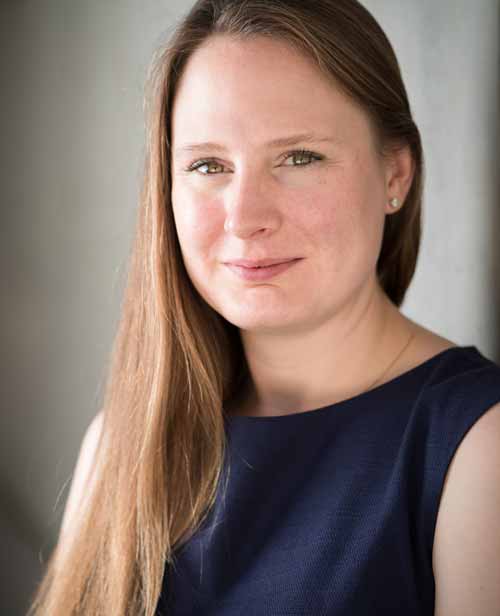Emma Farley Garners National High-Risk, High-Reward Award
Two UC San Diego scientists recognized for innovative biomedical research
October 5, 2017
By Mario Aguilera and Ioana Patringenaru

Two researchers at the University of California San Diego have been selected to receive awards from the National Institute of Health’s (NIH) 2017 High-Risk, High-Reward Research Program.
The NIH created the awards, given to “exceptionally creative scientists,” to support unconventional approaches to major challenges in biomedical research.
Through the program, Emma Farley, an assistant professor at UC San Diego’s Division of Biological Sciences and School of Medicine, has been awarded the NIH Director’s New Innovator Award. Melissa Gymrek, an assistant professor in the School of Medicine and Department of Computer Science and Engineering, will receive the NIH Director’s Early Independence Award.
The High-Risk, High Reward program, part of the NIH Common Fund, accelerates scientific discovery by supporting high-risk, high-impact research proposals that may not fare well in the traditional peer review process despite their potential to advance the field. Applicants of the program are encouraged to think outside-the-box and to pursue exciting, trailblazing ideas in any area of research relevant to the NIH mission.
“I continually point to this program as an example of the creative and revolutionary research the NIH is supporting,” said NIH Director Francis Collins, M.D., PhD. “The quality of the investigators and the impact their research has on the biomedical field is astounding. I always look forward to seeing what the new awardees are proposing and to watching how it is accomplished over the years.”
Farley, who joined UC San Diego in 2016, employs high-throughput functional approaches within developing embryos to decipher how the instructions for successful development are encoded in our genomes. She studies enhancers which encode these instructions and act as genetic switches to control the timing and location of gene activity. Farley received a master’s in biochemistry from Oxford University and a PhD in developmental biology from the MRC London Institute of Medical Science.
She worked as a postdoctoral researcher at UC Berkeley and Princeton University, where she exploited the sea squirt Ciona intestinalis as a model organism for functional genomics. She developed cost-effective and scalable methods to create and functionally test millions of enhancer variants in every cell of a developing embryo. Her research enabled the first high-throughput dissection of an enhancer within whole developing embryos and revealed the unexpected property that enhancer features and organization must be sub-optimized to produce tissue-specific patterns of gene activity. Her lab at UC San Diego continues to investigate how enhancers encode the instructions for successful development and how mistakes in these instructions lead to disease. Find out more about Farley and her work through her lab website, Naked Scientists podcast interview and Genes to Genomes blog.
The NIH Director’s New Innovator Award, established in 2007, “supports unusually innovative research from early career investigators who are within 10 years of their final degree or clinical residency and have not yet received a research project grant or equivalent NIH grant.”
Gymrek, who joined UC San Diego in 2016, studies genetic variation in humans. More specifically, her work focuses on mutations linked with variations in copy numbers of short tandem repeats, or microsatellites.
These mutations already have been implicated in about 30 conditions. The best known is perhaps Huntington’s Disease, which causes the progressive breakdown of nerve cells in the brain. About 30,000 people suffer from the condition in the United States. These people all have more than 40 copies of a specific repeat. The more copies they have, the sooner they are affected by the disease and the more severe it is.
Gymrek works on developing algorithms and other tools to better understand tandem repeats and answer questions regarding their properties and impact at a genome-wide and population-wide scale. She was selected as one of Forbes magazine 30 Under 30 in 2017. More information is available at the Gymrek lab website.
The NIH Director’s Early Independence Award, established in 2011, provides an opportunity for exceptional junior scientists who have recently received their doctoral degree or completed their medical residency to skip traditional post-doctoral training and move immediately into independent research positions.
The NIH Common Fund supports a series of exceptionally high-impact programs that cross NIH Institutes and Centers. Common Fund programs pursue major opportunities and gaps in biomedical research that require trans-NIH collaboration to succeed. For 2017, NIH issued 12 Pioneer awards, 55 New Innovator awards, 8 Transformative Research awards, and 11 Early Independence awards. The 2017 awards total approximately $263 million and represent contributions from the NIH Common Fund; National Institute of General Medical Sciences; National Institute of Mental Health; National Center for Complementary and Integrative Health; and National Institute of Dental and Craniofacial Research.
